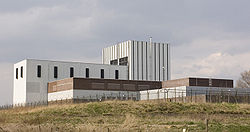Dodewaard nuclear power plant
| Dodewaard nuclear power plant | |
|---|---|

The Dodewaard NPP today in its shut down state viewed from the river bank
|
|
| Country | Netherlands |
| Coordinates | 51°53′59″N 05°41′10″E / 51.89972°N 5.68611°ECoordinates: 51°53′59″N 05°41′10″E / 51.89972°N 5.68611°E |
| Construction began | 1963 |
| Commission date | March 26, 1969 |
| Decommission date | March 26, 1997 |
| Operator(s) | BV Gemeenschappelijke Kernenergiecentrale Nederland (BV GKN) |
| Power generation | |
| Units decommissioned | 1 × 58 MWe |
Dodewaard nuclear power plant was a nuclear power plant with a boiling water reactor (BWR) in the Dutch town of Dodewaard. The plant halted energy production in 1997.
The plant in Dodewaard was the first nuclear power plant established in the Netherlands. It was built by the Dutch government, mainly as a means to obtain know-how about the construction and exploitation of a nuclear power plant. The plant was therefore relatively small with a net output of only 58 MW. Construction was started in 1965 and the facility opened on March 26, 1969, in the presence of Queen Juliana.
Since the Chernobyl disaster in 1986, the political tide turned against nuclear energy, which was already a heavily debated issue in Dutch politics. With no prospect of the construction of new nuclear power plants in the Netherlands, Dodewaards function as a research centre became superfluous. The ownership decided to halt the relatively small and expensive electricity production in 1997.
On March 26, 1997 the complex was shut down, 7 years earlier than originally planned. The complex is being dismantled in phases. Firstly, all fissionable material was removed, followed by a complete closure of the buildings to trap any remaining radioactivity. After a period of 40 years, the plant will be demolished and the site will become available for other purposes.
On April 9, 2005, the last remaining fissionable material was removed and on June 1, 2005, the 40-year waiting period went into effect. The complex remains tightly guarded.
...
Wikipedia

